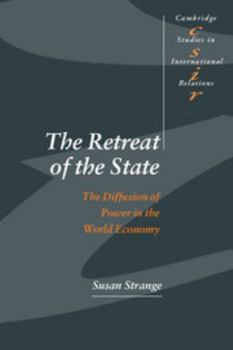The Retreat of the State: The Diffusion of Power in the World Economy
Select Format
Select Condition 
Book Overview
Adopting new and much more comprehensive concepts of both power and politics, The Retreat of the State develops a theoretical framework to show who really governs the world economy. It goes on to... This description may be from another edition of this product.
Format:Paperback
Language:English
ISBN:0521564409
ISBN13:9780521564403
Release Date:November 1996
Publisher:Cambridge University Press
Length:240 Pages
Weight:0.88 lbs.
Dimensions:0.5" x 5.9" x 8.9"
Customer Reviews
2 ratings
States as Mafias
Published by Thriftbooks.com User , 15 years ago
Power The late Susan Strange's analyses of the `way of the world' are essential readings, because based on the cardinal concept of power: `Power is simply the ability of a person or a group so to affect outcomes that their preferences take precedence over the preferences of others.' She applies this principle in this book to the power struggle for world dominance between States, and between the States and other major players of which transnational companies (TNCs) are the most important ones. TNCs came to occupy the centre of world power because of the global shift from States to markets and the integration of national economies into one single world market. Evaluation of the role of TNCs Susan Strange's evaluation of the influence of the TNCs on world matters is astonishingly fair. 1. TNCs play a crucial role in determining who-gets-what in the world system via production, sales, services, location, employment, investment, research, innovation and taxation. 2. TNCs have done more than States and international organizations to redistribute wealth from the developed industrialized countries to poorer developing ones. (!) 3. TNCs played a major role in labor relations and in managing conflicts of interests. 4. TNCs have taken over the role of the State as tax-farmers and collectors of revenues (VAT). 5. TNCs form restrictive cartels to rig prices in favor of its members, constituting `conspiracies against the public'. The official war against these cartels is pretty much a farce. States as Mafias In one word, TNCs are a mighty parallel authority, turning the State into a Mafia-like organization: `Like a State, a Mafia is an economic parasite, in the sense that it raises revenue from the civil society by demanding payment for protection. Governments call this taxation to pay for public goods when they do it, extortion when the Mafia does it.' Centre and periphery, the US as hegemon, leadership The result of this power struggle is a growing asymmetry of power between States and the creation of a world hegemon, based on the alliance of a (mostly US) transnational business class and a State government (the US): 'within the soft velvet glove of worldly bureaucrats can be felt the iron fist of American power, exercised on behalf of the ruling elites of transnational capital.' The power of the TNCs is virtually unchallenged. They are hierarchies and not democracies. Their CEOs can divide and rule like renaissance Princes over shareholders, employees, suppliers, distributors and `strategic' allies. At the heart of the international political economy there is a power vacuum, not filled by inter-governmental institutions or by a hegemon who is willing to show leadership. Moreover, the system of global governance is lacking an opposition. `There is no force to check the arbitrary or self-serving use of power, or to see that it is used at least in part for the common good.' Warning `If the power of financial markets is not balanced by any countervailing po
An alternative analysis of IPE
Published by Thriftbooks.com User , 16 years ago
The late Susan Strange was a renowned academic and political thinker who took the study of International Relations in a new direction. Her book, The Retreat of the State, takes a theoretical framework developed earlier by Strange and applies it to wide variety of situations in International Relations; situations that are rarely considered by mainstream IR writers, despite their almost daily effects on our lives. Strange challenges the key assumption of IR and international political economics (`IPE') that it is the state that is the key player in IPE and puts forward a theory outlining how other players, from business to the Mafia, can effect IPE. The first section of the book starts by outlining Stranges' theoretical assumptions, including that the State is not the key player in international political economics that it is sometimes made out to be. She also sets out the redefine what is traditionally thought of as power in IR relationships, arguing successfully that power should be thought of as more that simply political muscle, using a much broader definition. Power and politics is more than simply military strength. The second half of the book uses six brief case studies, including the Mafia, Big Six accounting firms and Insurance, telecoms and cartels to test her theoretical assumptions. Using the theoretical base set up in the first half of the book, Strange looks at situations where there is, as she terms in, authority beyond that state. For example, in looking at organised crime, who often have sophisticated paramilitary organisations and governance structures, she suggests that the traditional way of looking at IPE (eg neo-liberal, realist and neo-realist) may be obsolete. The same with the Big Six accounting firms, whose power is derived from the States inability or refusal to create the rules for accounting and who have a disproportionate effect on the global economy. While Strange has not sought to explain in detail each of these cases, she has pointed out potential future research in these areas, using a theoretical framework that explains better than traditional IR theory. Overall, this book represents an important step in the development of IPE theory and indeed in IR theory in general. By allowing for actors other than the state, Strange has opened up a whole new world of analysis and assisted in solving many of the issues that traditional IR theory has failed to explain.





